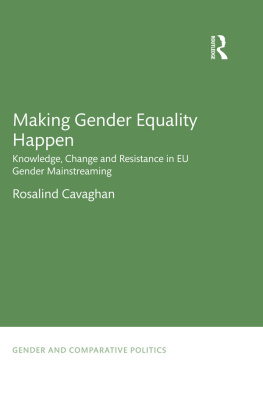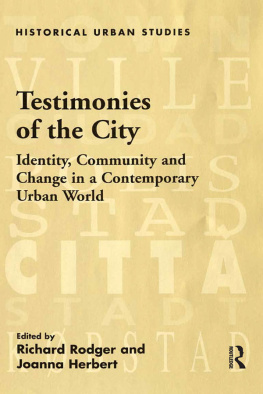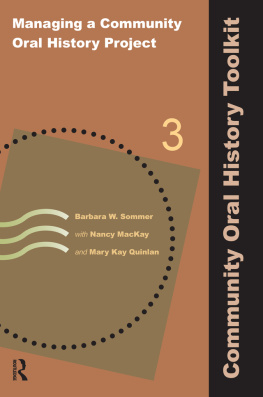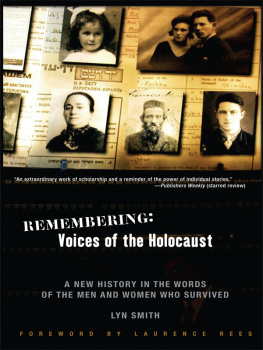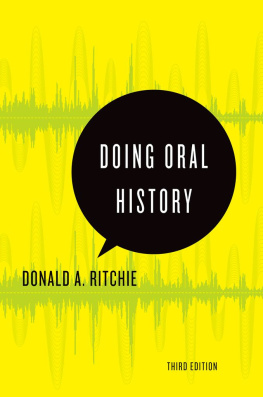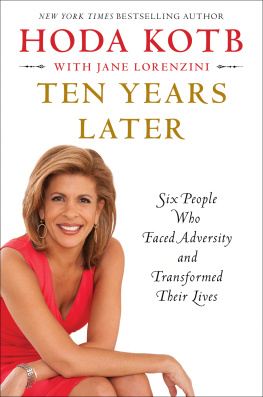Cover photo: courtesy of Farah Shoukry
Copyright 2018 by the American University in Cairo Press
113, Sharia Kasr el Aini, Cairo, Egypt
420 Fifth Avenue, New York, NY 10018
www.aucpress.com
All rights reserved. No part of this publication may be reproduced, stored in a retrieval system, or transmitted in any form or by any means, electronic, mechanical, photocopying, recording or otherwise, without prior written permission of the copyright owner.
eISBN 9781617979217
Version 1
In the 1960s, oral history projects were at the forefront of liberatory social movements in general, and the feminist movement in particular. Feminist historians challenged mainstream historical narratives that fed normalized cultural stereotypes of womens roles in history and society: they documented the marginalized voices of women and integrated their diverse points of view in historical narratives; they engaged in intellectual debates about the relation between the social and the individual, the workings of memory and the construction of subjectivity, and the relation between personal memory and collective memory. They also played a key role in highlighting the value of subjectivity and subverting the pseudo-binary between subjective and objective histories. In short, feminist oral historians succeeded in creating a knowledge backbone to support womens movements in many countries in the world by creating archives of womens lives, struggles, and voices. These interventions left their mark on critical engagements with histories of the marginalized and the oppressed whether the locus of study was gender, class, ethnicity, colonialism, or religion, among others. Oral histories, and feminist oral histories in particular, thus had significant implications for emancipatory politics and the forging of solidarities among diverse social movements and the academic debates that unfolded around them (see, for instance, Bonart and Diamond 2007; McEwan 2003; Armitage and Gluck 1998; Green 1997; Nair 2008; Geiger 1986).
Until the end of the twentieth century in the Arab world, archives of womens voices were almost nonexistent, despite the presence of many small documentation efforts tied to individual research projects (see, for instance, Abu-Lughod 1993; Sayigh 1998). However, the twenty-first century witnessed a marked increase in documentation projects in general, and of Arab womens voices in particular. The escalation of violence and exclusion that occasioned neoliberal governmentality, and the corresponding heightening of diverse modes of resistance and struggle against injustices and oppression, prompted many archiving efforts to document moments, events, spaces, and practices of contestation of power. Diverse social groups and movements globally who struggled against dispossession, violence, occupation, and expulsion from normative orders regulated by patriarchal structures of state and capital deployed different technologies and tactics in their search for justice and recognition. Alternative histories and practices of the contemporary became a hallmark not only of academe but, equally important, of ordinary men and women who sought to challenge the hegemony of the written, the archive, and the document as means through which relations to the past and present are articulated. Witnessing, listening, sensing, seeing, and documenting the everyday, the ephemeral, the immaterial, and the not so visible, became critical tools in practicing, relating to, and producing knowledge about domains, agents, spaces, and temporalities that emerged as key actors in making history and remaking the present. In the Arab world, the second intifada in 2000, the war on Iraq in 2003, the invasion of Lebanon in 2006, and most recently, the wave of Arab revolutions in 2011, resulted in radical historical transformations whose meanings continue to be contested and negotiated between the warring factions within academe and diverse communities engaged in processes of radical change. In addition, new technologies (e.g., digital technologies, social media, alternative museums, artistic productions, documentary film, and social theater, among others) brought in new practitioners and new audiences and have transformed the field of oral history, historiography, what comprises an archive, and what passes as history.
The increase in the radical shifts and upheavals in the Arab body politic poses a range of challenges to oral history practitioners about the role and limits of oral history in times of change. Many questions arise: What are the limits and potentials of oral history projects in times of change? How can oral history enable women to become active participants in transitional politics? What are the challenges facing oral historians/practitioners in an environment marked by bitter political divisions? What becomes of the archive, the document, and the written? What are the dangers of doing oral history in times of radical change? What are the challenges posed by the digital revolution in the field of oral history? What are the challenges to the construction of an objective and representative archive of voices in turbulent times with a gender lens? What are times of change and how should change itself be conceived? How does a sensibility to different simultaneous temporalities challenge the linearity and singularity of time progression that marks the writings of [H]istory or his-tory? What becomes of the political once we move the lens from the victorious to the excluded, from the center to the margins, and from the written to the oral and the sensory? What are the ethics of remembering and forgetting? What are the edges of the stories deployed in the struggle over the truth claims, legitimacy, and legibility of different pasts?
The conference Oral History in Times of Change: Gender, Documentation and the Making of Archives, organized by the Women and Memory Forum, in cooperation with the Supreme Council of Culture in Egypt and held in Cairo on September 1315, 2015 brought together scholars, researchers, students, artists, and practitioners to exchange views and experiences regarding the challenges facing oral history projects in times of change, with a particular focus on gender. The conference focused on documentation initiatives in Arab countries in transitional and conflict situations but also explored international experiences, particularly the South African contribution to the field of oral history in the post-apartheid era.
Over three days, participants in the conference discussed and deliberated questions and concerns around archives as a manifestation of power, the challenges and opportunities presented by new technologies to the making and preserving of archives, ethical concerns in the construction of archives, womens archives, and the production of alternative knowledge, as well as conceptual and methodological issues in oral history. Participants also explored the intersections and fluid boundaries between oral narratives, memoirs, autobiographies, biographies, social media, and novels, various generic expressions that cross the boundaries of the personal to the public and the collective. Memories and histories were subject to critical rethinking as informed by the many debates that occasioned the radical emergence of memory and memory studies in academe and beyond. The fluidity, malleability, and subjectivity that once marked the domain of memory were placed in relation to history, opening up the space for revisiting the blurred boundaries between the two. How power, silences, and refusals mark the production of histories was a common thread connecting the conversations at the conference.





